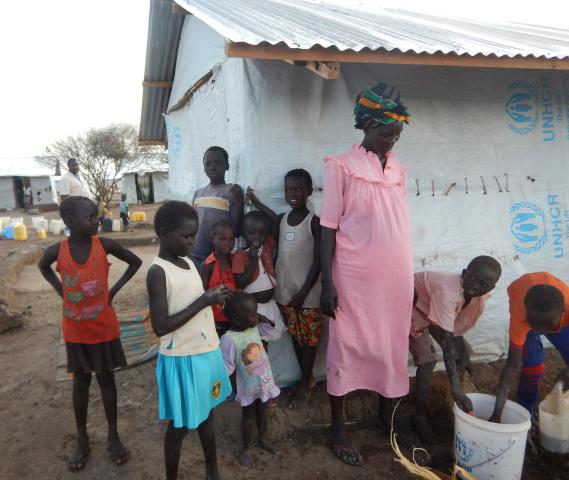Kalobeyei is a community “that promotes self-reliance, builds up resilience, and seeks longer-term solutions for the South Sudanese refugees.”

Seventeen people from across The United Church of Canada participated in the Mission & Service Global Pilgrimage to Kenya, from March 25 to April 4, 2017. The pilgrimage visited Mission & Service partners throughout the region. This series of blog posts shares the story of their journey.
She told us her name was Regina. Our small group of Mission & Service pilgrims listened as she related some of her story as a refugee in the new Kalobeyei Settlement, an integrated United Nations community established adjacent to the Kakuma Refugee Camp in northwestern Kenya.
Regina had fled the conflict between warring government and rebel forces in South Sudan with her two children, a son about 12 years old and a daughter about five. Abused and abandoned by her husband (“What’s the matter with you? All your babies die!”), she made her way to the border entry point for Kenya. Settled in Kalobeyei, she was making a home for her family in a compound near her half-sister and 10 nieces and nephews.
Regina’s shelter was built by Mission & Service partner, the National Council of Churches of Kenya (NCCK). It’s a mud-brick rectangle measuring three metres by six metres (10 by 20 feet). Inside Regina had neatly stored their meagre belongings and created a tidy dwelling. Despite the semi-arid and drought conditions she had used the hard-drying mud to raise the bed platforms to ensure her children are protected in the night from the sting of the scorpion. Outside she had created a kitchen enclosure for preparing her family’s meals. With her sister’s family they were making a start on a small vegetable garden.
Kalobeyei is a new approach to refugee settlement. On average, a refugee will spend 17 years in a camp. Recognizing the need for better intervention the United Nations and its partners including the Turkana County (provincial level) government and agencies like NCCK have created Kalobeyei, a community “that promotes self-reliance, builds up resilience, and that seeks longer-term solutions for the South Sudanese refugees.” Members of the host community of Kakuma live together with their guests in the new settlement which includes schools, health facilities, and other infrastructure to make a healthy community.
Regina and her children are among the first to settle, making a new life for themselves, gathering the strength for the journey ahead of them: repatriation to South Sudan or resettlement abroad.
—Carole Bennett of Toronto Conference